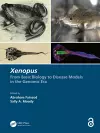
Xenopus
2 contributors - Hardback
£220.00
Sally A. Moody, Professor and Chair of Anatomy and Cell Biology at the George Washington University School of Medicine and Health Sciences, received her Ph.D. in Neuroscience during which she studied motor axon guidance cues in the trigeminal system of the chick embryo. Throughout her career, she has continued to be interested in understanding the mechanisms of axon guidance, and has studied the role of lineage factors in Xenopus, extracellular matrix proteins in chick, and genetic mutations in mouse. As a postdoctoral fellow, she was introduced to the Xenopus embryo, which remains a favorite. She made extensive fate maps of the cleavage stage Xenopus embryos, identified maternal mRNAs that contribute to neural fate, elucidated proteomic and metabolomic changes that occur within specific lineages during cleavage stages, and demonstrated lineage influences on the determination of amacrine cell fate in the retina. Currently, her laboratory is studying the gene regulatory network that stabilizes neural fate downstream of neural induction, and identifying novel factors that are required for cranial sensory placode development. She has served on several editorial boards in the fields of neuroscience and developmental biology, and on the board of directors of several societies focused on developmental processes.
Abraham Fainsod, Professor of Biochemistry and Wolfson Family Professor of Genetics at the Department of Developmental Biology and Cancer Research, the Institute for Medical Research Israel-Canada, Faculty of Medicine of The Hebrew University of Jerusalem. During his undergraduate studies at Hebrew University, he studied the genetic basis of chromosomal aberrations in cells in culture and continued for his Ph.D. in Genetics on the cloning and initial characterization of one of the first mammalian cell cycle genes. During his post-doctoral studies at Yale University, he focused on the early characterization of the Hox genes in mouse embryos. His interest on the genetic regulation of vertebrate embryonic development continued in his laboratory at Hebrew University focusing on the cloning and characterization of novel homeobox genes in the chicken embryo and in particular the multiple regulatory roles of the caudal homeobox genes. During a sabbatical at UCLA, he was introduced to the Xenopus embryo by Eddy De Robertis and his team, and since then shifted to this experimental system. He has studied the caudal genes, BMP signaling, and the size variability and scaling of morphogen gradients in Xenopus embryos. More recently, he is studying the biochemical, molecular and genetic origins of the Fetal Alcohol Syndrome, showing that alcohol interferes with Vitamin A metabolism causing a reduction in retinoic acid signaling and the many developmental malformations characteristic of this syndrome. Born in Mexico City, he has served as Chair of the Institute for Medical Sciences, the Department of Cellular Biochemistry and Human Genetics, the Human Genetics Program, the Undergraduate Studies Teaching Committee, and Deputy Dean for Academic Affairs.